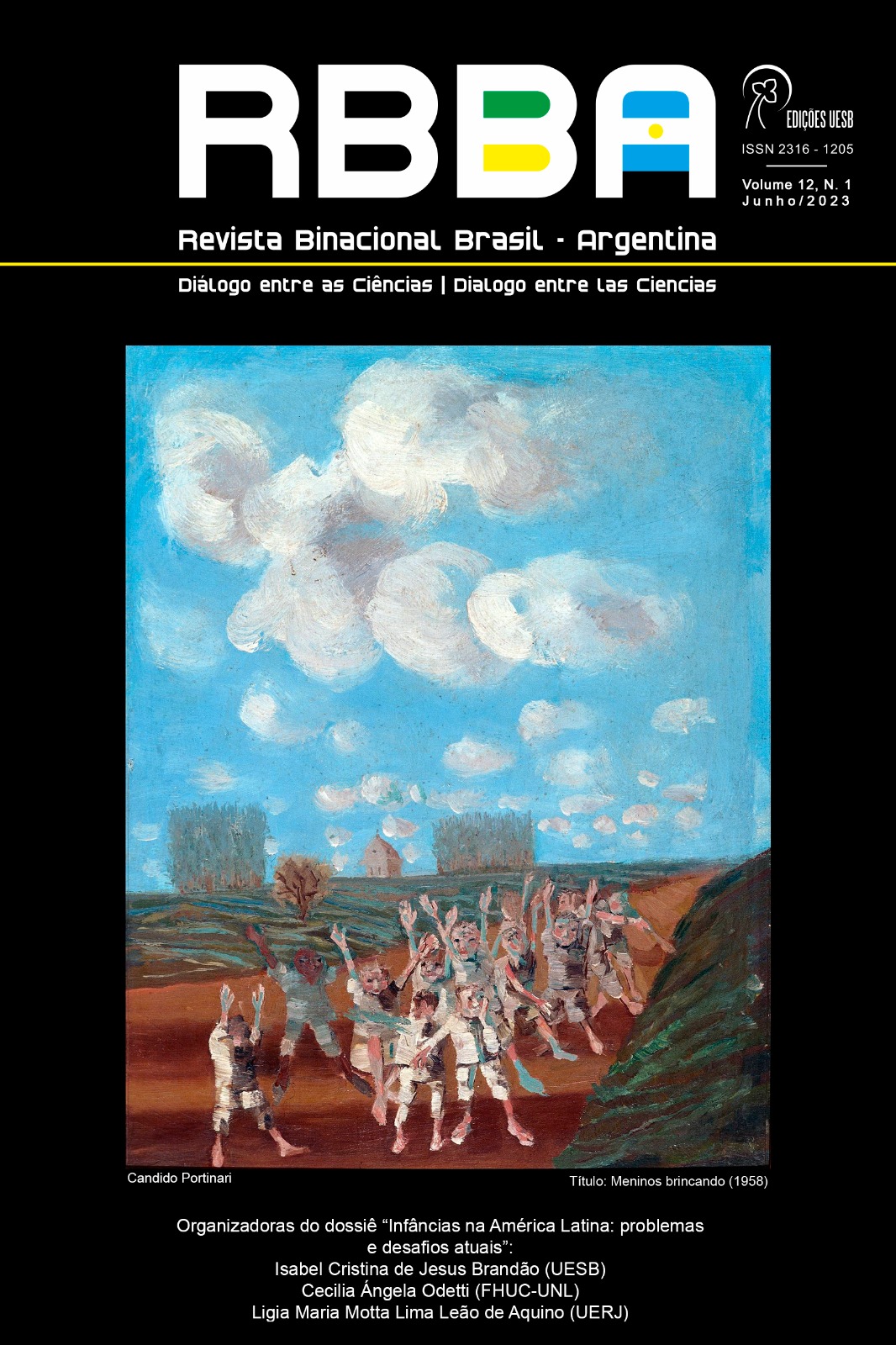THE INCLUSION OF EXPERIMENTAL ACTIVITIES IN THE SEQUENCES OF NATURAL SCIENCE ACTIVITIES PREPARED BY RESIDENTS OF PRIMARY EDUCATION IN A CONTEXT OF ISOLATION
DOI:
https://doi.org/10.22481/rbba.v12i01.11824Keywords:
Isolation context, Experimental activities, Activity sequences, VideoAbstract
The residence practices of the students of the Primary Education Teaching Staff in a context of isolation have been little studied. The migration of traditional school interactions to virtuality involved a series of didactic mutations. The work inquiries about the decisions that the residents of the fourth year of the Teaching Staff of the ISP No. 30 of the city of Esperanza, Province of Santa Fe make when developing a strategy for teaching natural sciences focusing attention on the empirical dimension, that is, in the experimental activities that they include in their sequences and how they resolve their implementation, using digital video/audiovisual as a tool. The work is part of what is considered the qualitative research paradigm. The intention is to interpret and understand a singular educational reality using techniques and instruments such as the online survey, and the analysis of documents and videos, characteristic of qualitative strategies (SABARIEGO PUIG, 2009). Some partial results show that the prioritized contents (46%) correspond to the axis of "Materials and their changes" and belong to the 3rd, 4th and 5th grade (86%), evidencing difficulty in differentiating experimental activities from those that are exploratory or modeling.
Downloads
References
AMBULUDÍ-MARÍN, J; BOLÍVAR CABRERA- BERREZUETA, L. TIC y educación en tiempos de pandemia: retos y aprendizajes desde una perspectiva docente. Episteme Koinonia, v. 4, n. 8, p. 185-203, jul. 2021. Disponível em: http://dx.doi.org/10.35381/e.k.v4i8.1352 Acesso em: 25 dez. 2022.
ANDRÉS, J. M. La investigación Ex Post-Facto. In: BISQUERRA ALZINA, R (org.). Metodologia de la Investigación Educativa, ed. La Muralla, 2009, p.196-230.
BODNER, G. F; HERRON, J. D. Problem-solving in Chemistry. In: Chemical Education: Towards Research-based Practice. ed. Kluwer Academic Publishers, 2002. p. 235-266.
CABRERA, J; DÍAZ-BARRIOS, C. Clase Nro. 1: La enseñanza de las Ciencias Naturales en las escuelas primarias en el período del 2020-2021: desafíos y experiencias. Módulo 1, La enseñanza de las Ciencias Naturales en las escuelas primarias: desafíos y claves para su abordaje en contextos de pandemia y post pandemia. In: ACTUALIZACIÓN ACADÉMICA EN NUEVAS PERSPECTIVAS PARA LA ENSEÑANZA DE LAS CIENCIAS NATURALES EN LAS ESCUELAS PRIMARIAS, 2022, Buenos Aires.
CARRASCOSA, J; GIL PÉREZ, D; VILCHES, A; VALDÉS, P. Papel de la actividad experimental en la educación científica. Caderno Brasileiro de Ensino de Física, v. 23, n. 2. p. 157-181. ago. 2006. Disponível em: https://periodicos.ufsc.br/index.php/fisica/article/view/6274/12764 Acesso em: 25 dez. 2022.
CIFA (CENTRO INVESTIGACIÓN FORMACIÓN ASESORAMIENTO); OBSERVATORIO DEMOS. Informe Educación en Tiempos de Pandemia. 2020. Disponível em: https://www.afpsarafaisal.org.ar/educacion-en-tiempo-de-pandemia/. Acesso em 25 dez. 2022.
FORMICHELLA, M. M; KRÜGER, N. S. Pandemia y brechas educativas: reflexiones desde la Economía de la Educación. REPOSITÓRIO INSTITUCIONAL CONICET DIGITAL, p. 1-19, mai. 2020. Disponível em: https://ri.conicet.gov.ar/handle/11336/109085. Acesso em 25 dez. 2022.
GALFRASCOLI, A. La enseñanza de las Ciencias Naturales en el marco de una educación a distancia sin elección. La propuesta de los cuadernillos “Seguimos educando”. Signos EAD, n. 4, p. 1-22. Disponível em: https://p3.usal.edu.ar/index.php/ead/article/view/5078/6718. Acesso em: 25 dez. 2022.
LÓPEZ, C. M; RAMÍREZ, L. D; ESPINOSA, E. A. La implementación de la actividad experimental desde los fundamentos de la mediación didáctica en docentes en formación en ciencias. Góndola, Enseñanza y Aprendizaje de las Ciencias, v. 13, n. 2, p. 251-271. Disponível em: http://doi.org/10.14483/23464712.12444. Acesso em 25 dez. 2022.
OSBORNE, R; WITTROCK, M. Learning Science: A generative process. Science Education, v. 67, n. 4, p. 489-508. Disponível em: https://onlinelibrary.wiley.com/doi/10.1002/sce.3730670406. Acesso em: 26 dez. 2022.
PÉREZ SERRANO, G. Investigación cualitativa: Retos e interrogantes. Madrid. La Muralla, 2014. 35p.
PRO BUENO DE, A. Aprender y enseñar con experiencias... y ahora para desarollar competências. Investigación en la Escuela, n. 74, p. 5-22. Disponível em: https://revistascientificas.us.es/index.php/IE/article/view/7001. Acesso em: 26 dez. 2022.
ROMÁN, J. A. La educación superior en tiempos de pandemia: una visión desde dentro del proceso formativo. Revista Latinoamericana de Estudios Educativos, v. 50, n. especial, p. 13-40. Disponível em: https://doi.org/10.48102/rlee.2020.50.ESPECIAL.95. Acesso em: 26 dez 2022.
SABARIEGO PUIG, M. La investigación educativa: génesis, evolución y características. In: BISQUERRA ALZINA, R (org.). Metodologia de la Investigación Educativa, ed. La Muralla, 2009, p.51-88.
SABARIEGO PUIG, M; MASOT LAFON, I; DORIO ALCARAZ, I. Métodos de investigación cualitativa In: BISQUERRA ALZINA, R (org.). Metodologia de la Investigación Educativa, ed. La Muralla, 2009, p. 293-328.
SALUM, M. B. El rol docente en pandemia: entre lo doméstico y lo escolar. 2021. 69 f. Dissertação (Mestrado em Ensino em Cenários Digitais) – Universidade Nacional de Chilecito. Disponível em: https://rea.unpa.edu.ar/handle/123456789/2315. Acesso em 26 dez. 2022.
SANDÍ DELGADO, J; SANZ, C. Revisión y análisis sobre competencias tecnológicas esperadas en el profesorado en Iberoamérica. Edutec Revista Electrónica De Tecnología Educativa, n. 66, p. 93-121. Disponível em: https://doi.org/10.21556/edutec.2018.66.1225. Acesso em 26 dez. 2022.
SOBRADO FERNÁNDEZ, L. M. Rol de las TIC en la orientación durante la pandemia de la COVID-19. Orientación y Sociedad, v. 22, n. 1, p. 1-24. Disponível em: https://doi.org/10.24215/18518893e043. Acesso em 26 dez. 2022.
TIGNANELLI, H. Para aprender Ciencias Naturales. El Monitor, Ciudad Autónoma de Buenos Aires. Jun. 2008.
Downloads
Published
How to Cite
Issue
Section
License
Copyright (c) 2023 Revista Binacional Brasil-Argentina: Dialogue between the sciences

This work is licensed under a Creative Commons Attribution 4.0 International License.






